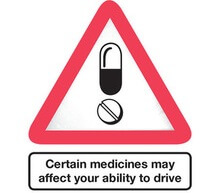DRIVING DRUGS LAW: The drug driving rules are very clear. It is illegal to drive if you are unfit to do so because either:
- You are taking legal prescription drugs or illegal drugs.
- You have certain levels of illegal drugs in your blood. This rule applies even if the drugs have not affected your ability to drive a vehicle.
Note: For this purpose, the definition of a legal drug is a prescription or over-the-counter medicine. You may be unsure whether you should drive while taking legal drugs? In this case, get expert advice from your doctor, a pharmacist, or a healthcare professional.
If the police believe a driver is on drugs they have the power to stop them. This is part of the police pull over procedure in Britain.
They can force you to perform a ‘field impairment assessment’. The police impairment check is a series of tests. For example they may ask you to walk a short distance in a straight line. The police can also use a roadside drug kit to screen drivers for cannabis and cocaine.
You can get arrested by the police if they think you are not fit to drive because of the drug taking. If this happens, you must provide a blood or urine sample at a police station. As a rule, if the test result is a positive you will get charged with a crime.
Driving and Prescription Drug Usage
If having legal drugs in your body impairs your driving you are breaking the law in England and Wales. Driving with over the specified limits of certain drugs in your blood is an offence. This also applies if you did not have them prescribed for you.
This list contains some of the common prescription medication associated with driving ability. Always discuss driving and drug usage with your doctor if you take:
 Amphetamine (e.g. dexamphetamine or selegiline)
Amphetamine (e.g. dexamphetamine or selegiline)- Clonazepam (50µg/L threshold limit in blood)
- Diazepam (550µg/L threshold limit in blood)
- Flunitrazepam (300µg/L threshold limit in blood)
- Lorazepam (100µg/L threshold limit in blood)
- Methadone (500µg/L threshold limit in blood)
- Morphine (80µg/L threshold limit in blood) or opiate and opioid-based drugs (e.g. codeine, fentanyl, or tramadol)
- Oxazepam (300µg/L threshold limit in blood)
- Temazepam (1,000µg/L threshold limit in blood)
The driving drugs law allows you to drive after taking those on the list providing:
- They were already prescribed for you and you followed the advice on how to take them. As a rule, the advice comes from a doctor or other healthcare professional.
- Talking the medication is not causing you to be unfit to drive. The same applies even if you are above the specified drug use limits.
Note: Driving with certain levels of drugs in your body without a prescription can result in a prosecution. Different drug driving laws exist in Scotland and Northern Ireland. But, you can still get arrested if you do not have fitness to drive a vehicle.
Drug Driving Penalties
Being convicted of a drug driving offence can result in:
- A driving ban for at least one (1) year.
- An unlimited fine.
- A prison sentence up to six (6) months.
- A criminal record.
Getting a conviction for drug driving will show on your driving licence for a period of eleven (11) years.
Note: There is a severe penalty for causing death by dangerous driving while under the influence of drugs. It can result in a prison sentence of up to fourteen (14) years.
Other Consequences of Drugs and Driving
If you get a conviction for driving while on drugs it could also mean that:
- The cost to insure a vehicle will increase. The premiums would be ‘significantly’ higher than normal.
- Your employer will see the conviction showing on your driving licence if you drive for your work.
- Travelling to certain countries (e.g. the USA) will become more difficult.
Note: What does driving under the influence mean? In simple terms the definition of DUI is the act or crime of driving or operating a vehicle while affected or impaired by alcohol or drugs.
Drug Use and Driving
You must inform the Driver and Vehicle Licensing Agency (DVLA) if you have used illegal drugs or you misused prescription drugs.
Note: Failing to tell DVLA about a medical condition that affects your driving can result in a fine of £1,000 (and a prosecution if it contributes to a road accident).
Car or Motorcycle Licences
Use Form DG1 to report a drug problem or a medical condition to the DVLA (as a car driver or a motorcyclist).
Bus, Coach, or Lorry Licences
Use Form DG1V to report any drug problems or medical conditions to the DVLA (as a lorry, bus, or coach driver).
Note: The process of reporting drug use as a driver differs in Northern Ireland. You would need to inform the DVA using either Form DL1 (for car drivers) or Form DLM1 for lorry drivers.

